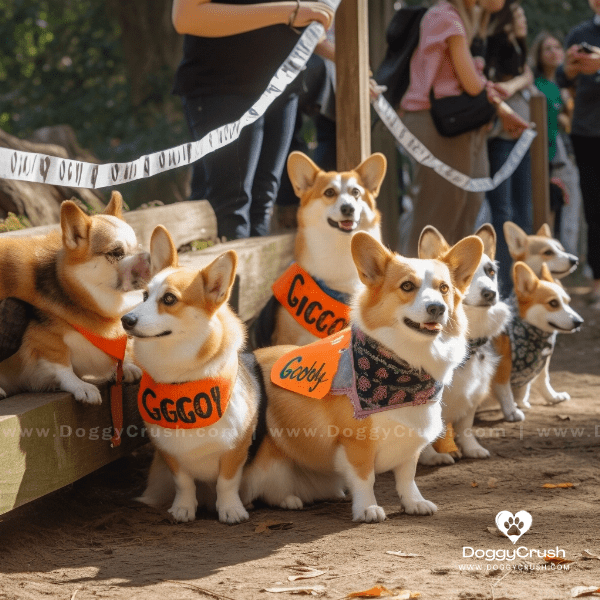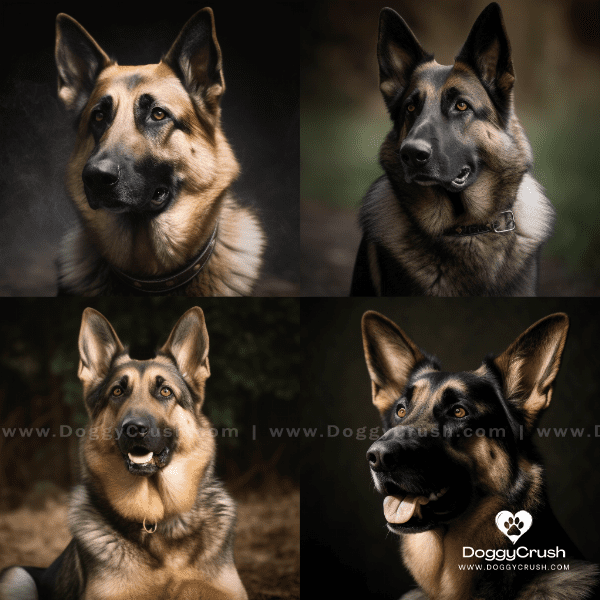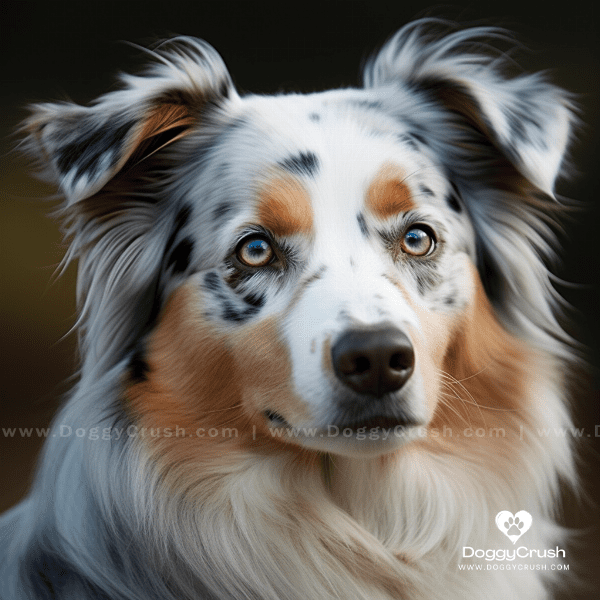Table of Contents
- The History and Origins of Welsh Corgi Dogs
- Physical Characteristics and Temperament of Welsh Corgis
- Training and Socializing Your Welsh Corgi
- Health and Wellness of Welsh Corgi Dogs
- Understanding the Different Types of Welsh Corgi Breeds
- Welsh Corgi Dogs in Popular Culture
- The Role of Welsh Corgis in Working and Farming
- Choosing the Right Welsh Corgi for You
- Caring for Your Welsh Corgi: Diet, Exercise, and Grooming
- Welsh Corgi Clubs and Organizations for Enthusiasts and Owners
The History and Origins of Welsh Corgi Dogs
Welsh Corgi dogs have a rich history that spans over 1,000 years. The breed originated in Wales, where they were used as herding dogs on farms. These dogs were prized for their agility, intelligence, and ability to work long hours without tiring.
The Origins of the Name “Corgi”
The name “Corgi” comes from the Welsh language, where “cor” means “dwarf” and “gi” means “dog.” This name accurately describes the breed’s unique physical characteristics, as Corgis have short legs and a long body.
The Evolution of Welsh Corgi Breeds
There are two main types of Welsh Corgi breeds: the Pembroke Welsh Corgi and the Cardigan Welsh Corgi. The Pembroke Welsh Corgi is the more popular of the two, and is believed to have been brought to Wales by Flemish weavers in the 12th century. The Cardigan Welsh Corgi, on the other hand, is believed to be the older of the two breeds, and has been in existence in Wales for over 3,000 years.
Corgis in Welsh Folklore
Welsh Corgis are also steeped in folklore and legend in Wales. According to Welsh legend, the Corgi was the preferred mount of fairy warriors. The breed was said to have been a gift from the fairies, who used them to pull their carriages.
Royal Connection to Welsh Corgis
The popularity of Welsh Corgis grew exponentially after Queen Elizabeth II began breeding and owning them in the mid-20th century. The Queen’s first Corgi, Susan, was given to her as a gift in 1944, and since then, the breed has been synonymous with the royal family. The Queen has owned over 30 Corgis during her reign, and has been credited with raising awareness of the breed worldwide.
Overall, the history and origins of Welsh Corgi dogs are fascinating and deeply rooted in Welsh culture and tradition. Whether you are a fan of the breed for their herding abilities or their adorable looks, there is no denying the impact that Welsh Corgis have had on dog lovers around the world.
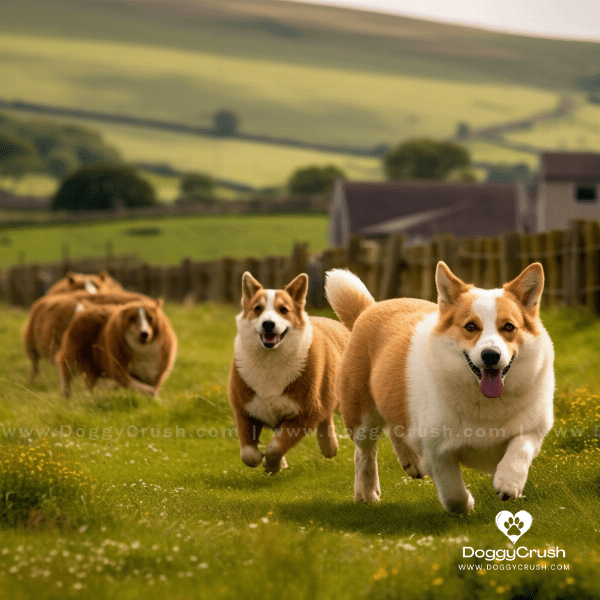
Physical Characteristics and Temperament of Welsh Corgis
Welsh Corgis are known for their distinctive appearance and friendly personalities. Here, we’ll take a closer look at the physical characteristics and temperament of this beloved breed.
Physical Characteristics
Welsh Corgis are a small to medium-sized breed, with a sturdy and muscular build. They typically stand between 10 and 12 inches tall and weigh between 25 and 30 pounds. The breed’s most distinguishing physical feature is their short legs, which are perfectly proportioned to their long body. They have a double coat that is thick and weather-resistant, with a variety of colors including red, sable, black, and tan.
Temperament and Personality
Welsh Corgis are known for their friendly and affectionate personalities. They are extremely loyal and bond closely with their owners, often becoming protective of them. They are also intelligent and quick learners, making them an ideal breed for training. Despite their small size, Welsh Corgis are active and energetic, and require plenty of exercise and playtime to stay healthy and happy.
One thing to note about Welsh Corgis is that they can be prone to barking. This is a trait that stems from their herding instincts, as they were originally bred to control livestock by nipping at their heels and barking to keep them in line. Early socialization and training can help mitigate this tendency, but it’s important to keep in mind if you’re considering bringing a Welsh Corgi into your home.
Overall, Welsh Corgis are an endearing breed with a lot of love and energy to offer. Their unique physical characteristics and friendly personalities make them a favorite among dog lovers around the world.
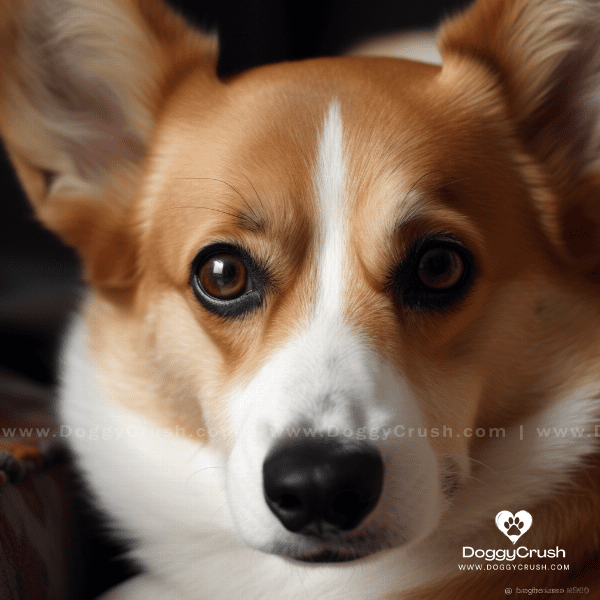
Training and Socializing Your Welsh Corgi
Welsh Corgis are intelligent and eager to please, making them relatively easy to train. However, like any breed, they require consistent training and socialization to develop good behavior and manners.
Basic Training
Basic training for Welsh Corgis should start with simple commands such as sit, stay, and come. Positive reinforcement techniques such as treats and praise work well with this breed, as they respond well to encouragement and praise. It’s important to be patient and consistent with training, as Corgis can be stubborn at times.
Socialization
Socialization is critical for all dogs, including Welsh Corgis. This breed can be protective of their owners, so early and consistent socialization is important to prevent aggressive behavior. Introducing your Corgi to new people, animals, and environments can help them feel comfortable and confident in different situations.
Crate Training
Crate training is a useful tool for housebreaking and providing a safe space for your Corgi. Introducing your Corgi to their crate gradually, with positive reinforcement and treats, can help them feel comfortable and secure in their crate. It’s important to not use the crate as a form of punishment, as this can lead to negative associations.
Overall, training and socializing your Welsh Corgi is an important part of responsible dog ownership. With consistency, patience, and positive reinforcement techniques, your Corgi can develop good behavior and manners, making them a well-behaved and beloved member of your family.

Health and Wellness of Welsh Corgi Dogs
As with any breed, Welsh Corgis are prone to certain health issues. Here, we’ll take a closer look at some of the common health concerns for this breed, as well as tips for maintaining your Corgi’s overall health and wellness.
Common Health Concerns
One of the most common health concerns for Welsh Corgis is hip dysplasia. This is a genetic condition in which the hip joint doesn’t develop properly, leading to pain and mobility issues. Other common health concerns for this breed include intervertebral disc disease, eye problems, and obesity.
Preventative Measures
While some health issues may be unavoidable, there are steps you can take to prevent and manage certain conditions. Maintaining a healthy diet and exercise routine can help prevent obesity, which is a risk factor for many health issues. Regular veterinary check-ups can also help detect and manage health concerns early on.
Mental Stimulation
In addition to physical health, mental stimulation is important for the overall wellness of your Welsh Corgi. This breed is intelligent and active, and requires mental stimulation to prevent boredom and destructive behavior. Puzzle toys, training exercises, and interactive playtime can all provide mental stimulation for your Corgi.
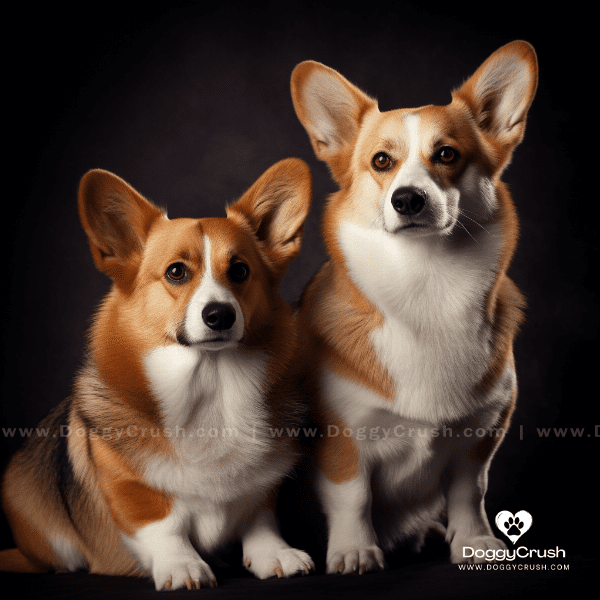
Understanding the Different Types of Welsh Corgi Breeds
Cardigan Welsh Corgi
The Cardigan Welsh Corgi is the older of the two breeds and is known for its calm and loyal personality. They can be more reserved with strangers than the Pembroke Welsh Corgi and tend to be more independent. They have a longer tail and more rounded ears than the Pembroke Welsh Corgi, and often have a more prominent “ruff” of fur around their necks.
Comparison
Both types of Welsh Corgi breeds have a sturdy and muscular build and share the breed’s signature short legs and long body. They are both intelligent and affectionate dogs that require regular exercise and mental stimulation. However, they do have some notable differences in appearance and temperament.
When considering which type of Welsh Corgi to bring into your home, it’s important to take these differences into account and choose the breed that best suits your lifestyle and personality.
Overall, the Pembroke Welsh Corgi and the Cardigan Welsh Corgi are both beloved breeds with unique personalities and characteristics. Whether you prefer the outgoing and active nature of the Pembroke or the calm and loyal demeanor of the Cardigan, both breeds make wonderful companions for the right owner.
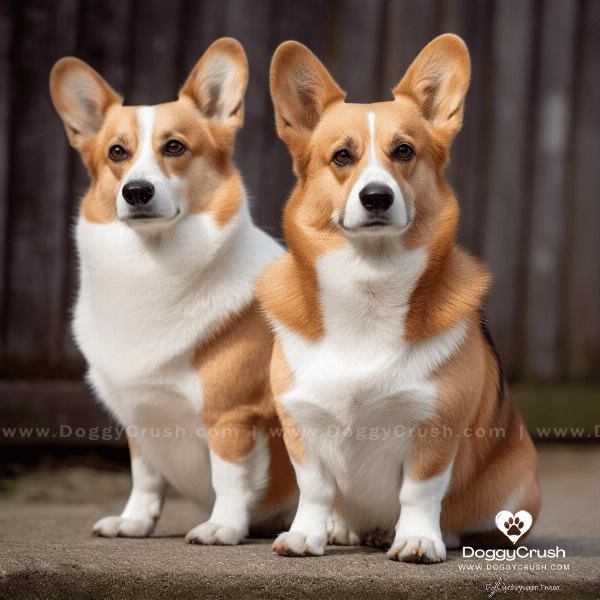
Welsh Corgi Dogs in Popular Culture
Welsh Corgi dogs have become a cultural icon in recent years, thanks in part to their association with the British royal family. Here, we’ll take a closer look at some of the ways Welsh Corgis have appeared in popular culture.
The Royal Connection
One of the most well-known associations with Welsh Corgis is their connection to the British royal family. Queen Elizabeth II has owned over 30 Corgis during her reign, and has been credited with raising awareness of the breed worldwide. The Queen’s love for Corgis has also inspired many other people to adopt the breed, leading to a rise in popularity for Welsh Corgis.
Film and Television
Welsh Corgis have also made appearances in film and television over the years. One of the most famous examples is Ein, the Welsh Corgi from the popular anime series Cowboy Bebop. Ein is a genetically-engineered “data dog” with heightened intelligence and other abilities.
In film, Welsh Corgis have appeared in a variety of roles. In the 2011 film “The Artist,” a Welsh Corgi named Uggie played the role of Jack, the loyal companion to the main character. In the 2017 film “Blade Runner 2049,” a Welsh Corgi named Elvis played the role of the dog owned by Ryan Gosling’s character.
Social Media
Welsh Corgis have become social media superstars in recent years, with many accounts dedicated to the breed on platforms like Instagram and TikTok. These accounts often feature photos and videos of Welsh Corgis in adorable poses and costumes, and have gained large followings around the world.
Overall, Welsh Corgis have become a beloved cultural icon, thanks to their appearance in popular culture and association with the British royal family. Their adorable looks and friendly personalities make them a favorite among dog lovers around the world.
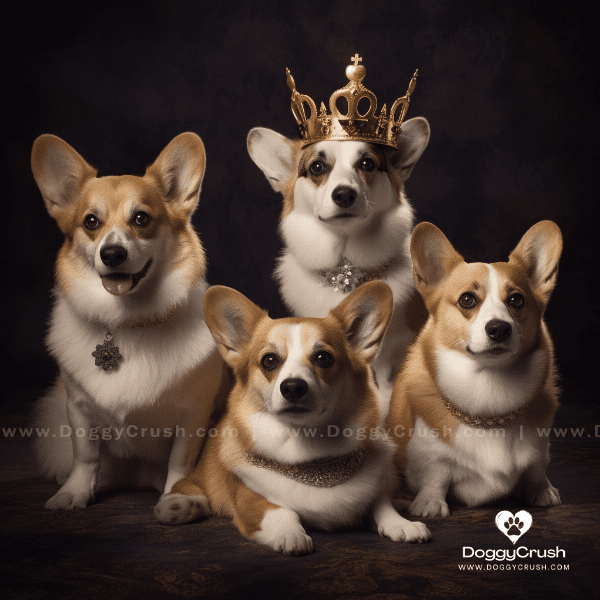
The Role of Welsh Corgis in Working and Farming
Welsh Corgis were originally bred as working dogs, particularly for herding cattle and sheep. Here, we’ll take a closer look at the role Welsh Corgis have played in working and farming over the years.
Herding
Welsh Corgis were originally bred to be herding dogs, and their short stature and agility make them well-suited for this role. Their herding instinct is still strong today, and many Welsh Corgis enjoy participating in herding trials and competitions.
Cattle Driving
In addition to herding, Welsh Corgis were also used for cattle driving. Their ability to nip at the heels of cattle and keep them moving in a desired direction made them an important part of many farming operations.
Rat Hunting
Welsh Corgis were also used for rat hunting on farms. Their small size and agility made them well-suited for catching rats in barns and other areas where they were causing damage.
Modern Roles
While Welsh Corgis are no longer as widely used in farming and working as they once were, they still have a place in modern roles such as service dogs, therapy dogs, and search and rescue dogs. Their intelligence and trainability make them well-suited for these roles, and their friendly personalities make them a favorite among handlers and owners alike.
Overall, Welsh Corgis have played an important role in working and farming throughout history. Their herding abilities and other skills have made them an indispensable part of many farming operations, and their legacy as working dogs has helped shape their breed into the beloved companion that they are today.
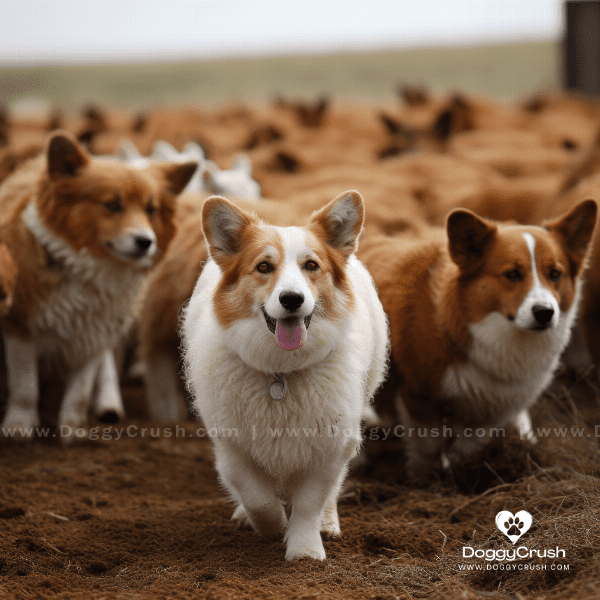
Choosing the Right Welsh Corgi for You
Welsh Corgis are a beloved breed with a lot to offer, but choosing the right Corgi for you and your family requires careful consideration. Here are some things to keep in mind when choosing a Welsh Corgi.
Breed Characteristics
As we’ve discussed, there are two types of Welsh Corgi breeds: the Pembroke Welsh Corgi and the Cardigan Welsh Corgi. While both breeds share many similarities, they do have some differences in appearance and temperament that may make one breed more suitable for your lifestyle than the other.
Breeder Reputation
When choosing a Welsh Corgi, it’s important to find a reputable breeder. Look for breeders who are knowledgeable about the breed, provide proper care for their dogs, and can provide references from previous customers. Avoid breeders who are unresponsive or unable to provide detailed information about their dogs.
Health Screening
Before bringing a Welsh Corgi into your home, it’s important to ensure that the dog has been health screened. This includes screenings for common health concerns such as hip dysplasia, eye problems, and intervertebral disc disease. A reputable breeder should be able to provide documentation of these screenings.
Adoption vs. Buying
Consider adopting a Welsh Corgi from a rescue organization instead of buying from a breeder. This can be a great way to provide a loving home to a dog in need, while also potentially saving money on adoption fees.
Your Lifestyle
Finally, consider your lifestyle and whether a Welsh Corgi is a good fit for you. This breed requires regular exercise and mental stimulation, so if you’re not able to provide these things, a Welsh Corgi may not be the right breed for you. Additionally, consider any other pets or children in your household and how they may interact with a Welsh Corgi.
Overall, choosing the right Welsh Corgi for you and your family requires careful consideration of breed characteristics, breeder reputation, health screening, adoption options, and your own lifestyle. With careful consideration and proper care, a Welsh Corgi can be a beloved companion for many years to come.
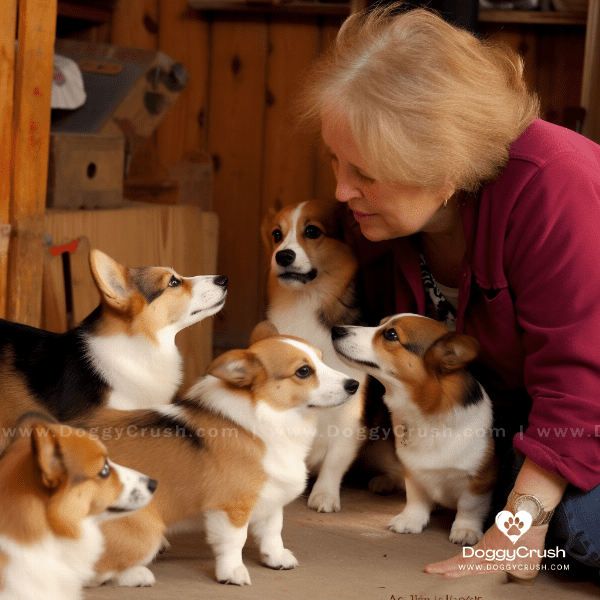
Caring for Your Welsh Corgi: Diet, Exercise, and Grooming
Proper care is essential for the health and happiness of your Welsh Corgi. Here are some important things to keep in mind when caring for your Corgi.
Diet
A healthy diet is key to maintaining your Corgi’s overall health and wellness. Choose a high-quality dog food that is appropriate for your Corgi’s age, weight, and activity level. It’s important to measure your Corgi’s food portions and avoid overfeeding, as this breed is prone to obesity.
Regular exercise is important for your Corgi’s physical and mental health. Daily walks, playtime in the backyard, and visits to the dog park are all good ways to provide your Corgi with the exercise they need. It’s important to monitor their activity levels, however, as overexertion can lead to joint problems in this breed.
Grooming
Proper grooming is important for maintaining your Corgi’s health and appearance. They have a double coat that requires regular brushing to prevent matting and keep the coat healthy. Bathing your Corgi as needed can also help keep them clean and healthy. It’s also important to trim their nails regularly and clean their ears to prevent infection.
Dental Care
Dental care is an often-overlooked aspect of dog care, but it’s essential for maintaining your Corgi’s overall health. Regular teeth brushing and dental check-ups can help prevent periodontal disease, which can lead to other health problems.
Vet Visits
Regular visits to the vet are important for maintaining your Corgi’s health and catching any potential health problems early on. It’s recommended to take your Corgi to the vet at least once a year for a check-up, vaccinations, and any necessary screenings or treatments.
Overall, caring for your Welsh Corgi requires a combination of proper diet, exercise, grooming, dental care, and veterinary check-ups. With proper care, your Corgi can live a happy and healthy life for many years to come.

Welsh Corgi Clubs and Organizations for Enthusiasts and Owners
If you’re a fan of Welsh Corgis, there are many clubs and organizations dedicated to this beloved breed. Here are some of the top clubs and organizations for Welsh Corgi enthusiasts and owners.
The Pembroke Welsh Corgi Club of America
The Pembroke Welsh Corgi Club of America is the official breed club for Pembroke Welsh Corgis in the United States. The club offers information on breed standards, health concerns, and events such as conformation shows and obedience trials. They also provide resources for finding reputable breeders and adopting Corgis in need.
The Welsh Corgi Club of Canada
The Welsh Corgi Club of Canada is a non-profit organization dedicated to promoting and preserving the Welsh Corgi breed in Canada. They offer resources for finding reputable breeders, as well as information on breed standards and health concerns.
Local Clubs and Meetups
In addition to national and international organizations, there are also many local clubs and meetups for Welsh Corgi enthusiasts and owners. These groups often offer opportunities for socialization, training, and fun activities such as group walks and playdates.
Overall, there are many clubs and organizations dedicated to Welsh Corgis around the world. These groups can be a great resource for information, support, and community for anyone who loves this beloved breed.
